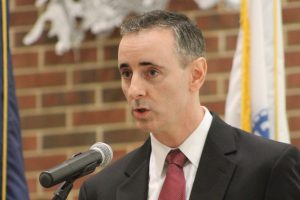Congressman Brian Fitzpatrick released a statement Sunday on the proposed Republican-backed replacement to the Affordable Care Act.
Fitzpatrick acknowledged that he feels the Affordable Care Act, also known as Obamacare, is broken and needs to be fixed. However, he said the Obamacare replacement proposed, the American Health Care Act, is not something he can support in Congress.
The decision on not to support the proposed Obamacare replacement that the nonpartisan Congressional Budget Office said would increase the number of uninsured Americans but save $337 billion in federal funds comes after a thorough review of the bill and health care issues, according to the congressman’s office.
“Although the American Health Care Act focuses on several much-needed reforms to our healthcare system, in its current form I cannot support this legislation. I have many concerns with this bill, and first among them is the impact on the single most important issue plaguing Bucks and Montgomery Counties, and the issue that I have made my priority in Congress: opioid abuse prevention, treatment and recovery,” he said in his statement.
Fitzpatrick said he will continue to push changes to health care laws.
While President Donald Trump has supported the American Health Care Act, he has stated he is willing to negotiate with those who oppose it.
“It’s coming together beautifully. We have conservative groups, other groups, everybody wants certain things,” Trump said last week, according to the Washington Post.
On Friday, a group of demonstrators backed by the Pennsylvania Democratic Party rallied outside Fitzpatrick’s Middletown office. They asked the freshman lawmaker to oppose the American Health Care Act.
A vote on the bill in congress could come as soon as the end of this week.
Below is the congressman’s full statement:
The Affordable Care Act is broken in many areas and desperately needs to be fixed or replaced with a system that works better for everyone. Premiums continue to skyrocket, deductibles are soaring, and insurers are opting out of exchanges. Moreover, competition is increasingly limited in the insurance markets; one-third of the counties in the United States have access to only one insurance provider, and five states have only one provider. Last year, premiums in Pennsylvania rose on average by roughly 33 percent. This trajectory is unsustainable. If we accept the status quo, our healthcare system will collapse and all of us will suffer as a result.
We urgently need a patient-centered, integrated healthcare model that provides individuals the freedom of choice, physicians the freedom to practice, and those with chronic disease, addiction or illness the freedom to live their lives knowing they have access to quality, affordable healthcare.
I have spent countless hours in these first two months analyzing this problem, listening to and meeting with constituents of all viewpoints, speaking with local officials, and learning the stories of patients, physicians, industry professionals, and representatives of almost every stakeholder engaged in healthcare reform.
After considering the current healthcare bill in a thorough and deliberate manner, I have concluded that, although the American Health Care Act focuses on several much-needed reforms to our healthcare system, in its current form I cannot support this legislation. I have many concerns with this bill, and first among them is the impact on the single most important issue plaguing Bucks and Montgomery Counties, and the issue that I have made my priority in Congress: opioid abuse prevention, treatment and recovery.
I commend both the Administration and House Leadership for focusing our nation’s attention on reforming our broken healthcare model. I am continuing my discussions with House leadership, urging them to address our concerns and to develop solutions based upon transparency and free-market principles to drive down healthcare costs and expand access to all. It is important to note that this bill is one of several reform measures being considered, and many more bills will surely follow. It is incumbent upon all elected officials, at every level of government, to take our time and to get this right. Healthcare is far too important and we must not settle for anything less.
As we continue working to reform and improve our healthcare system, please continue to let your voices be heard. I am listening intently and want all district residents to be involved in this process. At every turn, we must listen to each other, respect each other, and put our country first—always. No exceptions.









